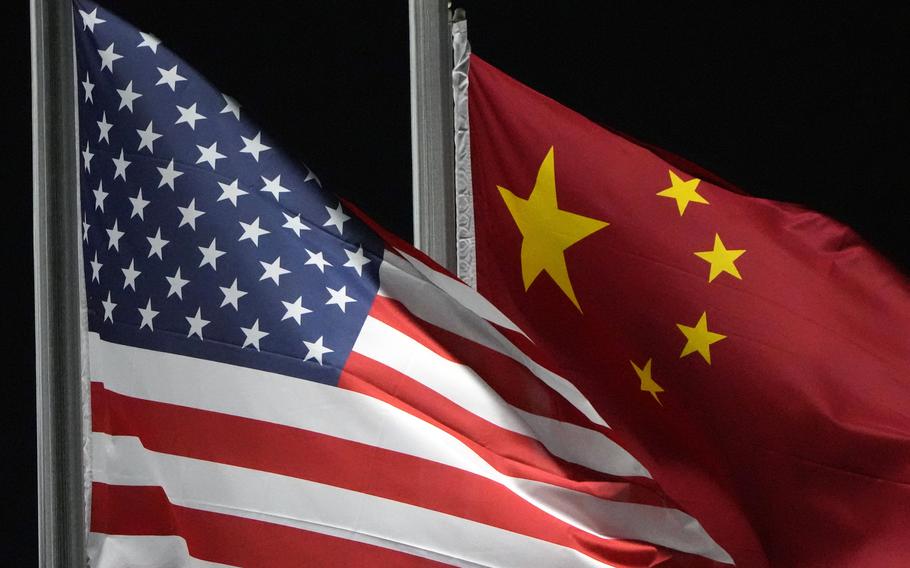
The American and Chinese flags wave at Genting Snow Park, Feb. 2, 2022, in Zhangjiakou, China. (Kiichiro Sato/AP)
China is for the first time sending one of its highest-ranking Chinese Communist Party officials to Donald Trump’s inauguration on Monday, illustrating Beijing’s two-pronged strategy of outreach to the next American president while also signaling it will hit back hard and fast if relations sour.
Trump had invited Chinese leader Xi Jinping to his inauguration ceremony, and China’s Foreign Ministry said on Friday that Vice President Han Zheng will attend as a special representative for Xi.
“We stand ready to work with the new U.S. government to enhance dialogue and communication … and find the right way for the two countries to get along with each other,” the ministry said in a statement.
In a break with tradition, Trump has invited a long list of foreign dignitaries to the ceremony Monday. Some leaders, such as Argentine President Javier Milei and Italian Prime Minister Giorgia Meloni, have confirmed attendance.
While a significant demotion from Xi, who is the most powerful Chinese leader in decades, Han is a marked upgrade from Beijing’s usual practice of sending the Chinese ambassador to the United States.
China wants to “pay back the respect that Donald Trump showed President Xi Jinping with his invitation,” said Wu Xinbo, an international relations scholar at Fudan University in Shanghai. He added that Japan and India - two key security partners of the United States - were only sending their foreign ministers.
“We hope that Vice President Han will … kick off a good start in engagement with the Trump administration,” Wu said.
Even before taking office, Trump has signaled that, by nominating proponents of a tough China policy to key foreign policy positions, he intends to take a hard-line approach toward China.
China is “the most potent and dangerous near-peer adversary this nation has ever confronted,” Sen. Marco Rubio (R-Florida), who has been nominated as Trump’s secretary of state and is under sanctions from Beijing, said at a Senate committee hearing this week, making clear that countering Beijing will be a key focus of the incoming administration.
In response to this approach, Beijing has advertised its ability to restrict key exports and investigate American firms operating in China to show that it won’t back down from a fight with Trump should he carry out promises to impose tariffs as high as 60 percent on Chinese imports.
But Beijing has also signaled willingness to push for an early deal to avoid an escalating bust-up over trade.
China’s Foreign Ministry responded positively when Trump said in a recent interview that his team had been talking to representatives of Xi, whom he described as a “powerful” leader he could work with.
Beijing is partly motivated by concerns that escalating trade tensions with the United States undermine a tentative economic recovery, after it launched a major stimulus late last year to fight deflation, a lengthy property-market slump and weak consumption.
Thanks to those measures and strong exports in the final three months of 2024, China’s gross domestic product grew by 5 percent for the year, exactly hitting the government’s target, the National Bureau of Statistics said on Friday.
Han sits on the powerful Politburo, the group of the 24 highest-ranking officials in the Chinese Communist Party.
As vice president, with a portfolio that covers diplomacy and environmental policy, Han regularly travels abroad to represent Xi at international events such as the U.N. climate negotiations.
Compared with his first decade in power, Xi has since his third term began in late 2022 increasingly delegated international travel to other high-ranking Communist Party officials, including Han and Premier Li Qiang.
There have been markedly fewer top-level exchanges with the United States in particular as tensions have spiked over American export restrictions targeting Chinese technology and Taiwan, the self-governing island Beijing claims as its territory.
China similarly courted Trump in the early years of his first term in office. Xi traveled to Mar-a-Lago and greeted Trump in Beijing with a lavish reception and a rare tour of the Forbidden City.
But those overtures did little to prevent a spiraling trade war of tariffs and restrictions on technology exports that mostly remained in place under President Joe Biden.
Xi never made a state visit to the United States under Biden, and Biden never traveled to Beijing. The only meeting between the two leaders on American soil happened in San Francisco in 2023 on the sidelines of the Asia-Pacific Economic Cooperation summit.
This time, Xi has signaled a more positive approach by congratulating Trump after his election win.
He sent a congratulatory message to Trump after his election win in November, saying the two countries should “find the right way to get along in the new era, so as to benefit both countries and the wider world,” according to the state-run Xinhua News Agency.
At the same time, Han congratulated JD Vance, the vice president-elect.
With these gestures, Beijing is trying to avoid a repeat of the Biden years, said Shen Dingli, a retired international relations scholar in Shanghai.
During those four years, the relationship “began low and ended high” with intense diplomatic standoffs over Taiwan and the Chinese balloon eventually giving way to limited cooperation on issues like curbing fentanyl production and tackling climate change.
“There is a good chance that there will not be such a turbulent start this time,” Shen said.
Vic Chiang in Taipei, Taiwan, contributed to this report.